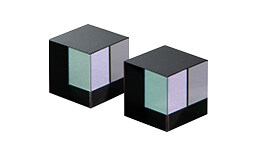メールフォーマットエラー
emailCannotEmpty
emailDoesExist
pwdLetterLimtTip
inconsistentPwd
pwdLetterLimtTip
inconsistentPwd


The Advantages of Using NPBS Prisms in Optical Systems
Introduction
In the field of optics, NPBS (Non-Polarising Beam Splitter) prisms have gained significant popularity due to their unique advantages over traditional prism designs. These prisms offer improved performance and versatility, making them an essential component in various optical systems. In this blog post, we will explore the advantages of using NPBS prisms and their impact on optical system design and performance.
Non-Polarising Nature
One of the key advantages of NPBS prisms is their non-polarising nature. Unlike traditional beam splitters, NPBS prisms do not introduce polarisation-dependent effects. This means that the polarisation state of the incident light is preserved, making them ideal for applications where polarisation control is critical. This advantage ensures accurate and reliable performance in systems such as interferometers, laser systems, and polarisation-sensitive imaging techniques.
High Transmission Efficiency
NPBS prisms offer high transmission efficiency, minimising light loss and maximising the overall system's performance. This is particularly important in applications where light intensity is crucial, such as laser systems and imaging techniques. The high transmission efficiency of NPBS prisms allows for brighter and clearer images, ensuring accurate measurements and analysis.
Broadband Operation
NPBS prisms can operate over a wide range of wavelengths, making them versatile for various applications. This broadband capability allows for compatibility with different light sources, enabling flexibility in optical system design. Whether working with visible light, ultraviolet, or infrared, NPBS prisms can provide consistent performance across the entire spectrum, making them suitable for a wide range of scientific and industrial applications.
Minimal Beam Distortion
Another advantage of NPBS prisms is their ability to minimise beam distortion. Traditional prisms can introduce beam deviation and angular dispersion, which can affect the accuracy and quality of optical systems. NPBS prisms, on the other hand, offer excellent beam stability and minimal distortion, ensuring precise beam control and alignment. This advantage is particularly important in applications such as laser beam steering and interferometry, where maintaining beam integrity is crucial.
Compact and Lightweight Design
NPBS prisms are typically designed to be compact and lightweight, making them suitable for integration into various optical systems. Their small form factor allows for easy integration into tight spaces, enabling efficient system design and optimisation. The compact and lightweight nature of NPBS prisms also contributes to improved system portability, making them ideal for field applications and portable optical instruments.
Durability and Longevity
NPBS prisms are constructed using high-quality materials and advanced manufacturing techniques, ensuring durability and longevity. They are designed to withstand environmental factors such as temperature variations and mechanical stress, making them reliable for long-term use. The robust construction of NPBS prisms ensures consistent performance over time, reducing the need for frequent replacements or recalibrations.

Conclusion
The advantages of using NPBS prisms in optical systems are significant and contribute to improved performance, versatility, and reliability. Their non-polarising nature, high transmission efficiency, broadband operation, minimal beam distortion, compact design, and durability make them indispensable in various applications. Whether in interferometry, laser systems, microscopy, or spectroscopy, NPBS prisms offer enhanced functionality and precision. By incorporating NPBS prisms into optical system design, researchers, scientists, and engineers can achieve superior performance, accurate measurements, and reliable results.

